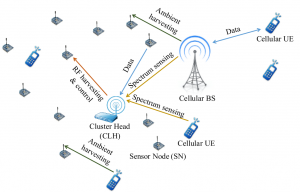| Turkish Title: | Radyo Frekansında Enerji Harmanlayan ve Aktaran Bilişsel Algılayıcı Ağların Markov Zincirleri ile Modellenmesi ve Analizi |
| Funded by: | TÜBİTAK |
| Funding Scheme: | 3501 Career Development Program |
| Grant agreement no: | 114E739 |
| Project period: | 04/2015 – 04/2019 |
| Status: | In progress |
With the recent developments, ubiquitous sensor networks that are embedded in the environment and communicating with our mobile devices and the cloud, are expected to make the previously not sensed information available, offer us a truly interactive and immersive experience, and have great impact on fields such as health, energy, environment, etc. However these trends lead to the increase of total energy usage in such networks, which heightened the importance of the use of green technologies. Especially with the recent developments in VLSI technology leading to a reduced total energy need, makes the harvesting of ambient electromagnetic waves for energy a viable option for sensor nodes. This is called RF Harvesting in the literature. Enabling the perpetual operation of sensor nodes without the need for changing batteries, RF harvesting is advantageous as it is possible to find RF energy anywhere. Moreover, when the ambient RF energy is not enough, it is also possible to supply extra energy to the nodes via RF energy transfer from a node that is connected to a steady power supply.
Another scarce source in wireless technology is the spectrum. Recently, cognitive radio technology has emerged as a method to use the spectrum in a more efficient manner. The unlicensed spectrum is expected to soon become not enough for the sensor networks that are the subject of this project. It might not be economically feasible to assign a dedicated spectrum to such applications. Thus, for especially delay tolerant applications, use of cognitive radio technology can be the solution to the spectrum shortage in sensor networks.
In this project, RF energy harvesting and transmitting sensor networks where each node is tolerant to delays and requires little processing power and throughput, but the sum data amount and total energy requirement is high. The goals of the project are as follows:
- Detailed and realistic modeling of the sensor networks that are the subject of the project via Markov chains,
- For a tractable analysis, reduction of the model complexity via the decoupling method without losing accuracy and analysis of the model, theoretical analysis of the conditions at which the decoupling approximation is valid,
- In order to make the model more realistic, modeling of RF energy transfer and harvesting as a function of system parameters via realistic simulation platforms and experiments,
- The analysis of the trade-offs between information transfer, energy transfer and energy harvesting that are emerging in the proposed energy transferring and harvesting cognitive sensor networks via the obtained models, the analysis of multi-user gain that is expected to happen in energy transfer,
- Optimization of the system by using Partially Observable Markov Decision Processes – POMDP and the feasibility analysis of the sensor network applications on the proposed system.
Publications
- A. O. Ercan, M. O. Sunay, I. F. Akyildiz, “RF Energy Harvesting and Transfer for Spectrum Sharing Cellular IoT Communications in 5G Systems,” to appear in IEEE Transactions on Mobile Computing, 2017.
- S. W. Munir, O. Amjad, E. Zeydan, A. O. Ercan, “Optimization and analysis of WLAN RF energy harvesting system architecture,” in Proceedings of IEEE Wireless Communication Systems (ISWCS), 2016 International Symposium on, Sept 2016.
- S. W. Munir, “Optimization and Analysis of WLAN RF Energy Harvesting System Architecture for Low Power Wireless Applications,” M.Sc. Thesis, Özyeğin University, Istanbul, Turkey, Jan 2017.
- O. Amjad, “Modeling Of RF Energy Harvesting and Energy Consumption System for Low Power Wireless Sensor Networks,” M.Sc. Thesis, Özyeğin University, Istanbul, Turkey, Jan 2017.


